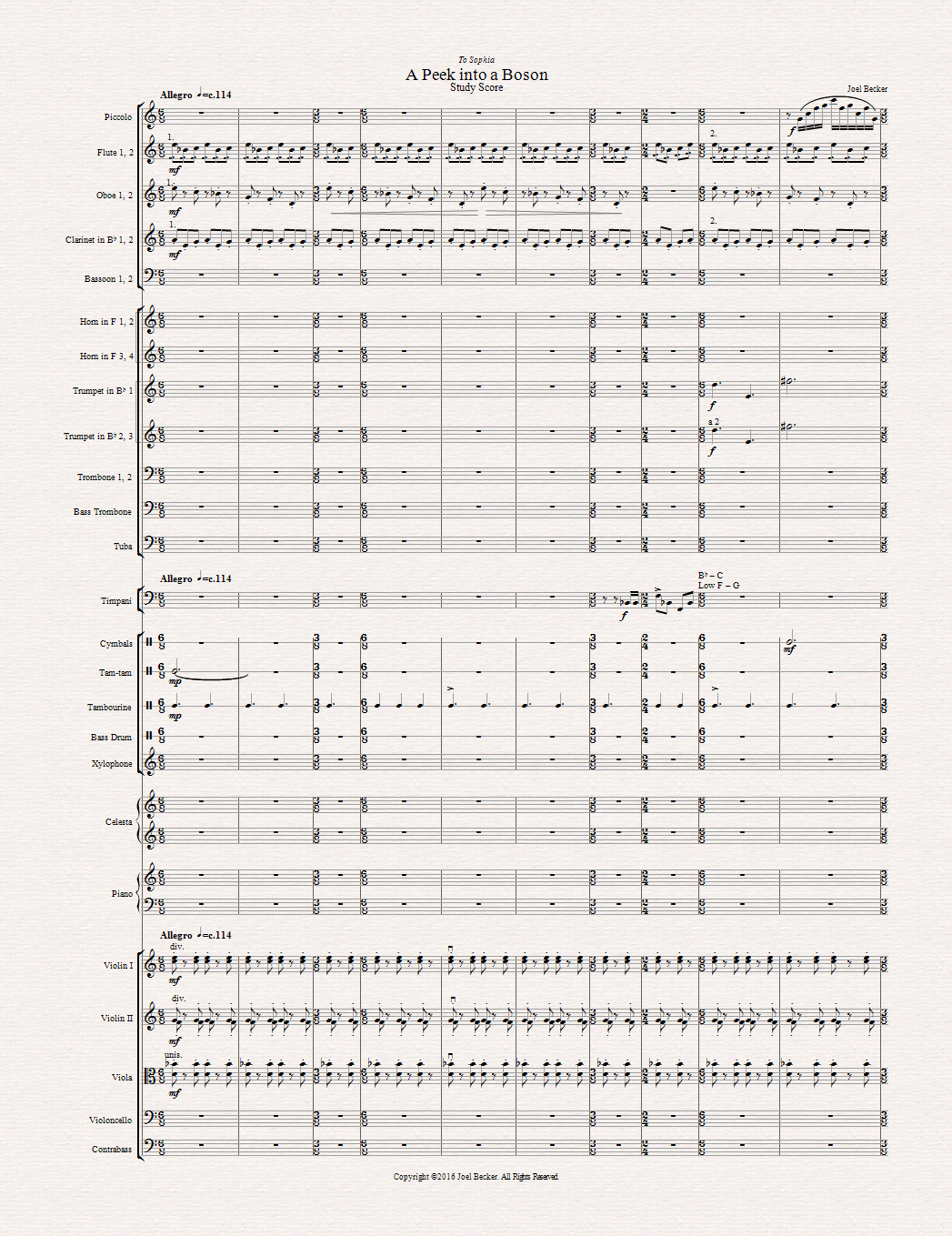
Before the conferences a few weeks ago I didn't have a minute to "flip the burger", working all day, all evening, many late (early?) nights, weekends. But during the week of Thanksgiving, as well as the weekends before and after, I certainly did make the flip, to Joel the mad composer. After creating a "list of works" as composers do, I noticed it had been a decade since I composed any art music (or "serious music") for orchestra or of any significance, and that bothered me. "Use it or lose it." But since it wouldn't be very motivating to compose something significant without a purpose other than a finished project sitting around on my computer, I searched for orchestra composition competitions, and since I was impatient about it, and maybe too ambitious for my own good, I chose the one with the soonest deadline: I had one week to compose, prepare, and mail it. With my dear wife's approval, I set off for battle!
And a battle it was. Having been so long since I scored for orchestra with the intent of real performers and a real conductor needing to follow it in full detail, I had to consult my orchestration books over and over. Also I had 0.001 inspiration...not sure what unit that is, but you get the idea. Several times during the first couple of days I almost abandoned the project. I developed then tossed several ideas, tossed many bars of music along the way. But roughly 60 hours later, it was complete. ...with a few major typographical errors that could cost winning a competition, which I caught after mailing it 2-day to get it there on time. And that was after I needed to print it from the local library (80 pages at $0.10/page) because my printer's cartridge needed replaced to avoid streaks. There were a number of chuckles like that to look back on.
OK enough not-so-exciting story behind it. The work is dedicated to my wife Sophia, who has been so dedicated to me and our children...especially during times like the last couple weeks. So here it is, the new work of musical art from just a few days ago: "A Peek into a Boson":
How'd you come up with the title?
Somehow I knew you'd ask that. Actually I composed the entire piece before coming up with the title, though I did have an abstract idea for it. So the music stands on its own. The competition asked for a program note, and since I wanted to let the music speak for itself instead of explaining the theory behind it, or exaggerating the circumstances around its composing, I thought I'd make it more accessible by giving the audience something to imagine with it. Something sensational but real. And so the program notes read:
Suppose we could peer into the elementary particle of the universe that communicates the four fundamental forces of nature: the boson. What would we find if we could tour its inner workings, and fully understand just what it is? How deep would its levels of detail go? Surely we would find secrets concerning the entire universe. Or perhaps even something fundamental to our own humanity. Such a glimpse may not be possible; however, we have music, and the imagination.
But why is that interesting?
Funny how you keep asking the next question I anticipated. So, the boson is one of the two types of elementary particles in the Standard Model of particle physics (the other being the fermion). Elementary refers to the fact that we know of no sub-particles that comprise it. However, as we've historically found in science, and as is the underlying assumption of all scientific inquiry, all effects have a cause. There was a reason molecules could be converted into other molecules: it was the atoms that comprised them. There was a reason an electron stays in the vicinity of its nucleus: the "weak" force. There is a reason quarks "stick" together to form electrons, protons, and neutrons: the gluon. Whenever a particle is observed to behave in a particular way, there is a reason for it. And so far we've found deeper and deeper levels of detail.
Now here's a particularly interesting question: at what point will we come to a "particle" (which is some "thing" that we cannot see but can only detect if anything) that has no further need for explanation? A particle cannot just be a ball that bounces or hits another object, because that sense of bouncing or collision we are familiar with is governed by molecular interactions, and we are already well below that level of detail. Currently our best guesses for the next "level of detail" (which isn't necessarily a spatially tinier level) are string theory and supersymmetry. And those "strings", sometimes spanning high-dimensional "branes", are "made of" what? What makes them vibrate? Is there even an end to the detail? Or is the very existence and laws of the universe infinite, without end?
And what could science tell us about the nature of such an infinite mechanism? Nothing. Because at that point we have left the field of science, which can only explain the observable universe. Fortunately for the important aspects of our existence, science is not the only field of knowledge.
Experiencing the impossible
And so such a full tour of the inner workings of the "elementary" particles is not possible. So "A Peek into a Boson" is just a tickling of the mind and imagination, to fancy what kinds of things we might know if we were to be able to have such an experience, yet some of which we can know from other sources for inquiry.